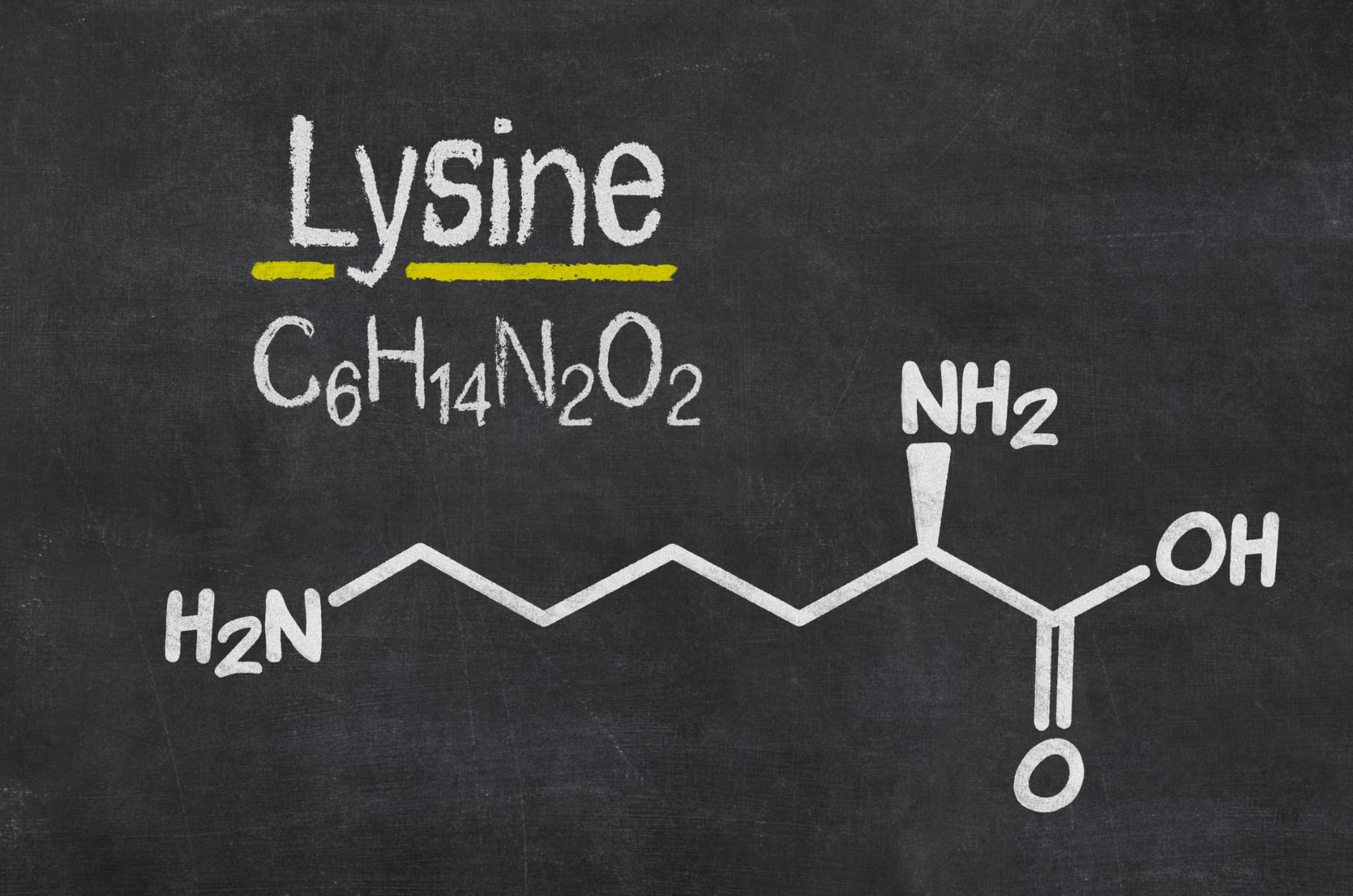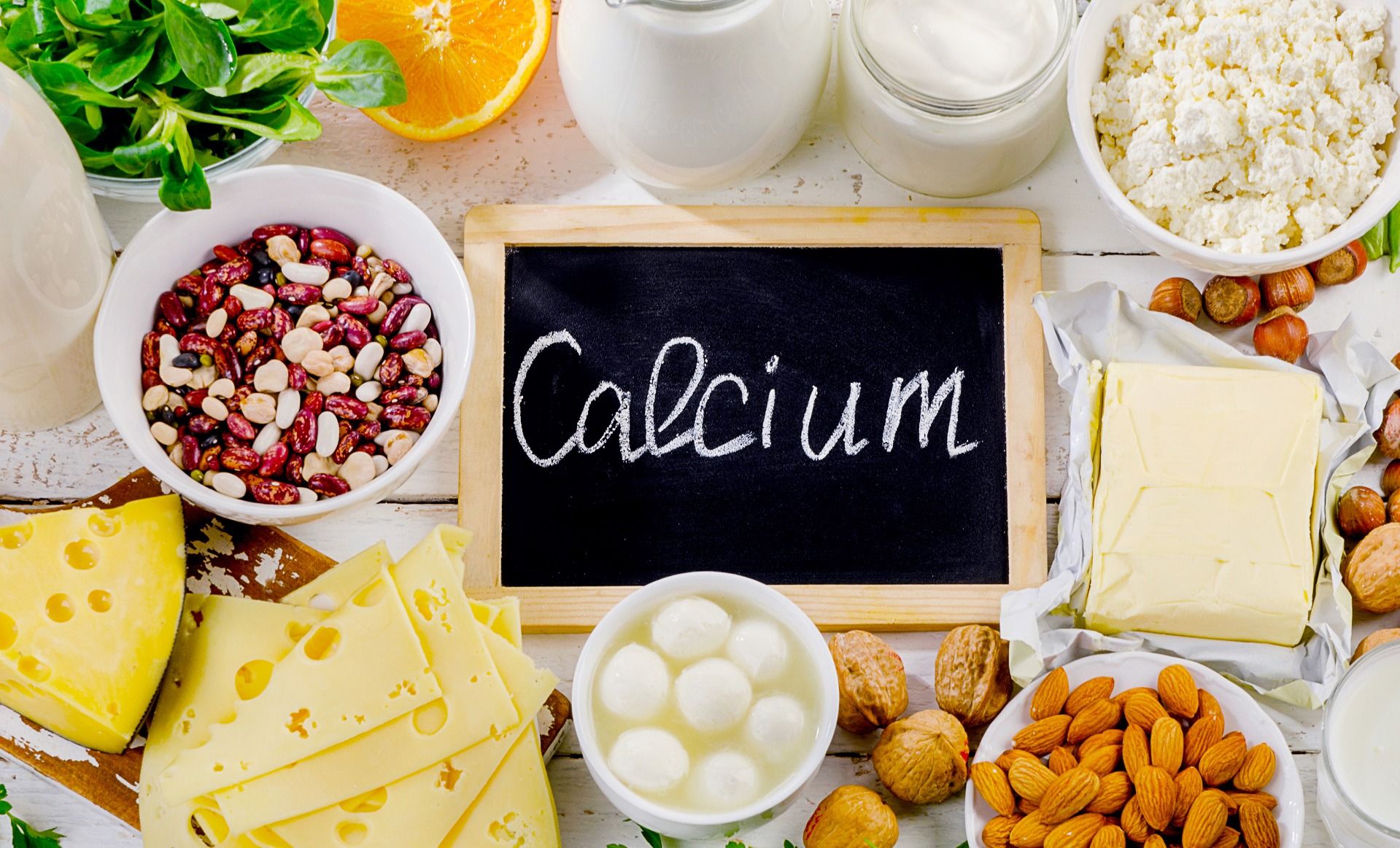Table of Contents
Lysine – Essential Amino Acid and Building Element of Protein
Lysine is an essential amino acid which is the building element of protein in our bodies. Since lysine is unable to synthesize by itself, it must be consumed by means of food or supplements. It is also called dibasic amino acid, similarly as arginine, cystein or ornithine. [1]
Originally, lysine was not used as a nutritional supplement, but only as a food ingredient used mainly in vegetarian food in which there is very often an absence of lysine. It used to be added to cereals, but it found its purpose also in the feed for farm animals. [2] It is known that lysine bonds with certain minerals, for instance with copper, which enables a faster transport of lysine into the red blood cells and thanks to that directly to the organism. [3]
A research focused on absorption of copper and ferrum has found out that the supplement of lysine does not intervene into the absorption of these minerals, although the previous research has shown interactive effects with these two minerals. This research was applied on mice to which a 1,5% of lysine and 20% of protein in feed were given. Moreover, it was discovered that zinc is not influenced by lysine under the same conditions as copper or ferrum. [4]

Lysine is transported into the brain through the same neurotic transporter which secures the storage of arginine into the brain. It is supposed that excessive intakes of lysine could stop the ability of arginine to produce nitric oxide in the brain tissue and this could have a negative impact on the neurotic functions. [5]
Symptoms of Lysine Deficiency
To the most common symptoms of the lysine deficiency belong the following:
- loss of appetite
- heavy hair loss
- lack of concentration
- fatigue
- frequent mood swings
- anemia
- liver complications
- reproduction defects [6]

You might be interested in these products:
Lysine and Its Main Functions
1. It Improves Calcium Assimilation
According to scientific studies, it has been found out that lysine increases the assimilation of calcium. Thanks to one research, it was proven that lysine has functional effects in case of diets with low amount of proteins (0,7 kg/proteins) and high amount of dibasic amino acids (lysine, arginine, histidine). In such case, lysine was able to increase the calcium assimilation much better than under different conditions, for example in diets with mixed amino acids. [7]

2. It Helps to Improve Physical Performance
Thanks to the increased intake of lysine, you can achieve the increase of your physical performance. Amino acids, such as lysine, serve as building elements of proteins which supports the muscle regeneration and formation. Moreover, when combined with other amino acids, lysine can efficiently affect the fat burning and active formation of muscle mass. [8]
3. It Supports the Immune System and Has an Antibacterial Effect
One study has proved that in treatment in which lysine and arginine were present, the immune system of patients has improved markedly. Moreover, in case of children suffering from respiratory viral diseases, it has been proven that thanks to this treatment has improved their health condition. So, Lysine has not only antibacterial effects, but it is also able to fight against viruses and form in our bodies antidotes which improve our immunity. [9]

4. It Cures Herpes and Cold Sores
Lysine plays an important role in production of carnitine in human body, which is responsible for transformation of fats into energy and also for maintaining normal cholesterol lipoprotein levels. School of Medicine at University of Maryland found out that lysine can affect actively against the formation of cold sore and herpes. Thanks to its antibacterial effects, it is able to fight effectively against already formed herpes and also prevent from their formation by supporting the immune system. Moreover, lysine has a positive impact on health of skin, nails and hair. [10]
5. It Helps the Collagen Formation
Collagen is the most prevalent protein in human body. It is a building element of bones, muscle fibers and cartilage. Lysine helps to produce collagen and at the same time prevents its extensive excretion. [11] Calcium and collagen represent a dynamic pair which helps to prevent bone fractures. If a person has a lack of lysine, the production of collagen and calcium is slowed-down. This can lead to bone fragility, which is also one of the main reasons why people suffering from lack of lysine have fragile bones.

6. It Accelerates Wound and Fracture Healing
Lysine is one of the most important amino acids which participate in muscle regeneration, healing of wounds and fractures. Since it helps to fasten the calcium assimilation, it can effectively reduce the amount of time necessary for the regeneration. However, it can be appreciated also by people having problems with knees, since lysine has the ability to produce collagen and thus support the connective tissues and cartilage. A study carried out by the University of Maryland proved that the lack of lysine can lead to long term convalescence and the healing time can be visibly increased. [12]

7. It Reduces Stress and Has a Calming Effect
To find out what effects has lysine on stress and chronical fatigue, a study has been carried out on individual members of one family from Syria which lasted for three months. It has been discovered that thanks to a regular intake of lysine, a visible decline of chronical fatigue was shown in case of men. On the other hand, in case of women, lysine had a positive effect on stress reduction and even on skin and hair improvement. [13]
8. It Increases Bone Strength
In one study in which there were 15 healthy and 15 osteoporosis-suffering women, one group was given calcium and the other group was given lysine. Another group of 45 female patients with osteoporosis was given lysine, valine and tryptophan. [14] In case of group of patients taking lysine, better assimilation of calcium and its less excretion have been shown. That is the reason why lysine can be used as prevention against osteoporosis. [14]
Benefits for Athletes
Deficit of lysine can show itself mainly in case of athletes who do difficult and exhausting trainings. Characteristics of lysine deficit are anemia, slowed down wound healing, fatigue, but also longer amount of time of recovery after trainings. Regular intake of lysine in case of athletes can help to increase the growth hormone and also support the physical performance. Since lysine is a building element of protein, it supports a fast regeneration and growth of muscle mass. Moreover, it helps to produce collagen which secures strong cartilage and muscle fibers that are often too exerted during the training. [15]

What Food Sources of Lysine Do We Know?
Lysine offers its riches by means of natural sources in food or in food supplements. Among the sources which have the biggest content of lysine for 100 grams are the following:
- beef and lamb – 3,582 mg
- parmesan – 3,306 mg
- turkey and chicken – 3,110 mg
- pork – 2,757 mg
- roasted soya beans – 2,634 mg
- tuna – 2,590 mg
- shrimps – 2,172 mg
- pumpkin seeds – 1,386 mg
- eggs – 912 mg
- white beans – 668 mg [16]

Lysine is offered in supplements either in powder or in a tablet form, so it is up to you which form of nutritional supplements you prefer more. Advantage is that lysine often comes in combination with other amino acids – for example BCAA, which in this composition effectively supports growth of muscle mass an at the same time secures muscle regeneration and support of the immune system.
What is the Recommended Daily Dose of Lysine?
Thanks to the recommendations proposed by World Health Organisation (WHO), Food and Agriculture Organization (FAO) and United Nations University (UNU), the dose of lysine which should be taken by a healthy person is 30 mg per kilogram of body weight or approximately 2,1 grams per 70 kilograms of body weight. [17]
We sincerely believe that thanks to this article you got to know why lysine is important for human body and why you may consider its intake. What experience have you had with lysine? Are you taking it? You can write your answer to the comment and in case you liked this article, you can support it with sharing.
[1] Mirmiranpour, Khaghani, Bathaie, Nakhjavani, Kebriaeezadeh, Ebadi, Gerayesh-Nejad, Zangooei. - The Preventive Effect of L-Lysine on Lysozyme Glycation in Type 2 Diabetes. - Acta Med Iran. 2016 (dostupné online) – https://www.ncbi.nlm.nih.gov/pubmed/26853287
[2] Flodin NW - The metabolic roles, pharmacology, and toxicology of lysine. - J Am Coll Nutr. 1997 (dostupné online) – https://www.ncbi.nlm.nih.gov/pubmed/9013429/
[3] Gao S, Yin T, Xu B, Ma Y, Hu M. - Amino acid facilitates absorption of copper in the Caco-2 cell culture model. - Life Sci. 2014 (dostupné online) – https://www.ncbi.nlm.nih.gov/pubmed/24931904
[4] Mitchell GV, Jenkins MY. - Effect of excess L-lysine on rat growth and on plasma and tissue concentrations of copper, iron and zinc. - J Nutr Sci Vitaminol (Tokyo). 1983 (dostupné online) – https://www.ncbi.nlm.nih.gov/pubmed/6427435
[5] Wass C, Klamer D, Katsarogiannis E, Pålsson E, Svensson L, Fejgin K, Bogren IB, Engel JA, Rembeck B - L-lysine as adjunctive treatment in patients with schizophrenia: a single-blinded, randomized, cross-over pilot study. - BMC Med. 2011 (dostupné online) – https://www.ncbi.nlm.nih.gov/pubmed/21501494
[6] 9 Lysine Benefits (Cold Sores) + Foods High In Lysine (dostupné online) – https://www.selfhacked.com/blog/lysine-health-benefits/
[7] Bihuniak JD, Sullivan RR, Simpson CA, Caseria DM, Huedo-Medina TB, O'Brien KO, Kerstetter JE, Insogna KL. - Supplementing a low-protein diet with ibasic amino acids increases urinary calcium excretion in young women. - J Nutr. 2014 (dostupné online) – https://www.ncbi.nlm.nih.gov/pubmed/24431325
[8] RAE UDDIN - Lysine Supplement Benefits - LiveStrong.com (dostupné online) – https://www.livestrong.com/article/366257-lysine-supplement-benefits/
[9] Azzarà A, Carulli G, Sbrana S, Rizzuti-Gullaci A, Minnucci S, Natale M, Ambrogi F. - Effects of lysine-arginine association on immune functions in patients with recurrent infections. - Drugs Exp Clin Res. 1995 (dostupné online) – https://www.ncbi.nlm.nih.gov/pubmed/7555612
[10] Griffith RS, Walsh DE, Myrmel KH, Thompson RW, Behforooz A. - Success of L-lysine therapy in frequently recurrent herpes simplex infection. Treatment and prophylaxis. - Dermatologica. 1987 (dostupné online) – https://www.ncbi.nlm.nih.gov/pubmed/3115841
[11] DrugBank - L-Lysine (dostupné online) – http://www.drugbank.ca/drugs/DB00123
[12] Thorne Research, Inc. - L-Lysine - Alternative Medicine Review Volume 12, Number 2 2007 (dostupné online) – https://altmedrev.com/wp-content/uploads/2019/02/v10-2-123.pdf
[13] Miro Smriga, Shibani Ghosh, Youssef Mouneimne, Peter L. Pellett and Nevin S. Scrimshaw - Lysine fortification reduces anxiety and lessens stress in family members in economically weak communities in Northwest Syria - Proc Natl Acad Sci U S A. 2004 Jun 1 (dostupné online) – https://www.ncbi.nlm.nih.gov/pmc/articles/PMC420386/
[14] Civitelli R, Villareal DT, Agnusdei D, Nardi P, Avioli LV, Gennari C. - Dietary L-lysine and calcium metabolism in humans. - Nutrition. 1992 (dostupné online) – https://www.ncbi.nlm.nih.gov/pubmed/1486246
[15] Kelsey Casselbury - What Are the Benefits of Taking L-Lysine? March 15, 2018 (dostupné online) – http://healthyeating.sfgate.com/benefits-taking-llysine-6478.html
[16] Daisy Whitbread - Top 10 Foods Highest in Lysine (dostupné online) – https://www.myfooddata.com/articles/high-lysine-foods.php
[17] World Health Organization, Food and Agriculture Organization of the United Nations, United Nations University - Protein and amino acid requirements in human nutrition - Report of a joint FAO/WHO/UNU expert consultation (WHO Technical Report Series 935) Publication date: 2007 (dostupné online) – http://www.who.int/nutrition/publications/nutrientrequirements/WHO_TRS_935/en


Add a comment